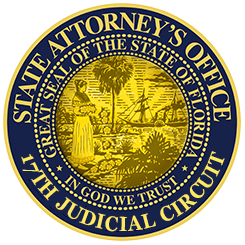Responsibilities of the State Attorney
The mission of the Broward State Attorney’s Office – the Office of the State Attorney for the 17th Judicial Circuit of Florida – is to build a safer community and promote justice, fairness and equity for all who live, work and visit here.
The office is responsible for prosecuting all alleged criminal violations of state law that occur in Broward County. Led by Broward State Attorney Harold F. Pryor, our staff consists of more than 460 dedicated public servants. That includes approximately 213 assistant state attorneys, investigators, victim advocates and support staff. State Attorney Pryor is a Florida constitutional officer who was elected by Broward County voters in 2020.
Under the Constitution of the State of Florida, the state attorney is the chief prosecuting officer of all criminal trial courts in the circuit and performs all other duties prescribed by general law. Our office is also involved in community organizations and efforts to fight crime, reduce recidivism, support victims, and promote justice and fairness for all.
The State Attorney is required to provide personnel and procedures for the orderly, efficient and effective investigation, intake and processing of all felony, misdemeanor, criminal traffic, juvenile and specially enumerated civil cases. These cases may be referred by law enforcement, by other state, county and municipal agencies, and members of the public. The State Attorney is required to represent the State of Florida in the prosecution of all criminal cases arising out of their respective circuits (F.S. 27.02). A criminal case may be generated by several different events. These events include:
Arrest: The state attorney must review every arrest for violations of state law in the circuit. This review process can be very extensive. The state attorney must rely on law enforcement to prepare arrest reports, victim affidavits, witness statements and to secure the evidence needed to prove each and every element of the offenses charged.
After the state attorney has reviewed all supporting documents and sworn testimony, a decision is made to either file an information or formal charge, decline to file any charges, file a change of charge, present the case to the Grand Jury for possible indictment, or require additional investigation.
Upon the filing of an Information, or an Indictment by the Grand Jury, the case then proceeds to arraignment, discovery preparation, depositions, motion responses, pretrial hearings, trial or plea, and finally sentencing. The appellate process then begins.
Non-arrest walk-in complaints: The state attorney receives complaints and reports of criminal activity from various sources, including law enforcement and the public. Each of these complaints must be investigated thoroughly to determine whether a crime has occurred and, if so, who has committed the crime. These investigations take place prior to the arrest of the accused. The investigation may include substantial witness statements, search warrants, subpoenas and more. When the State Attorney’s Office has completed its investigation, a decision is made to either file an information (formal charge) or decline to file any charges. If charges are filed, an arrest warrant or issue summons must be prepared to bring the accused into custody. Once the accused is arrested, the case proceeds to arraignment, discovery preparation, depositions, motion response, pretrial hearings, trial and sentencing. The appellate process then begins.
Initiated Investigations: The state attorney may initiate an investigation if he has reason to believe a crime has occurred and an investigation is warranted.
Executive Assignments: The state attorney receives assignments to investigate and prosecute cases outside his circuit when the Governor of Florida’s office orders an assignment. This occurs when another circuit has a conflict and asks the governor to re-assign the prosecution.
Grand Jury Investigations: The function of the Grand Jury in criminal matters is to investigate and determine whether there is sufficient evidence to justify an indictment (formal charge) against an accused person. The grand jury, made up of local citizens, must ascertain whether there is probable cause that a crime has been committed by the accused person. If they determine that the evidence is sufficient to constitute probable cause, the grand jury issues a “true bill” which then becomes the indictment (or formal charge) on which the accused will be put on trial.

